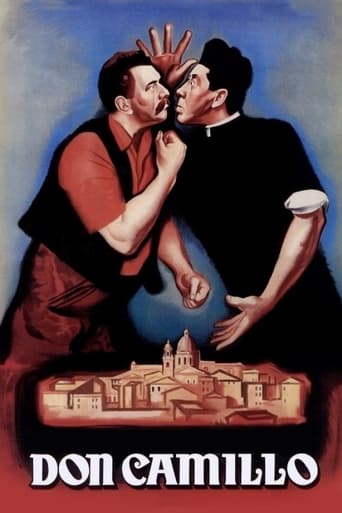writers_reign
This is based on a deceptively simple best-selling novel by Giovanni Guareshi which achieved International popularity and this, initial film in an eventual five, replicated the success of the novel though over the years it has lost a little of its lustre. This isn't really the fault of director Julien Duvivier who is responsible for several 'clssic' titles in several genres from Un Carnet de bal through Pepe le Moko, Le Fin du jour, Marie Octobre to name only four; nor is it the fault of Fernandel who was almost certainly the ideal actor to portray the simple priest who thinks nothing of holding two-way conversations with God and is not averse to hand-to- hand brawling with the followers of communist mayor Peppone, the priests' rival for the affection of the small village population and with whom he enjoys a love-hate relationship. Like the novel the film is episodic and more a series of vignettes than a conventional story with a beginning, middle, and end and perhaps this is what takes the edge off what is nevertheless an enjoyable film.
dlee2012
Don Camillo is, quite simply, one of the most heart-warming films ever made. Fernandel is perfectly cast in the title role, bringing Giovannino Guareschi's gentle short stories to life.The gentle humour and warm tone of the film allows it to convey its morals with nary a hint of didacticism.The comic potential of the ideological (and physical!) clashes between the fiery but lovable priest and his nemesis, the Communist mayor of the village, is fully exploited. Fernandel's facial expressions and timing are superb, as is the warmth he conveys.For those unfamiliar with the Don Camillo tales, Jesus (in the form of a crucifix on the church wall) guides (and frequently rebukes) Don Camillo, for his imperialistic attempts to try to win the hearts and minds of the villagers away from the Communist Party.Jesus literally functions as the moral adjudicator of the ideological war between the priest and the mayor, finding both equally guilty of empire-building. He frequently reminds Don Camillo of his duty to show compassion and love to his flock when Camillo becomes more interested in scoring points against the communists. It is Jesus who understands the peasants and has faith that everything will be fine in the end. Jesus understand the villagers more than they understand themselves, and shows empathy for them even when the priest feels they are insulting Him.Although ostensibly Roman Catholic, Christians of all other denominations will gain an enormous amount from watching this film. With its light touch, perfect casting and warmth, this is the perfect comedy. Very faithful to the original books, this film is highly recommended to young and old.
Gerald A. DeLuca
French comic actor Fernandel embodied the title role while remarkable Italian character actor Gino Cervi played his spiritual and political opponent. More than a rustic comedy, the film epitomizes the postwar political polarization in Italy and symbolizes the famous "compromesso storico"---historical compromise---under which Italy would long continue to be governed. This successful film spawned a series of popular sequels, mostly with the same two actors, all based on the Giovanni Guareschi novels. A point of clarification: this was a French-Italian co-production and was first released in the U.S. in its French-language version with English subtitles before the dubbed English version with narrator Orson Welles went into circulation. The Italian-language version, not readily available, is the most appropriate one.
Spleen
...Actually, of all those adjectives, `Italian' was the first to leap to mind. I can't believe the IMDb has decided to classify this film under a French name. `Things happen there that could happen nowhere else in the world,' says the narrator. It's easy to believe.The Catholics and the communists are battling for the soul of a small village. It's to be hoped that neither side ever wins. Nor is it likely that either side ever will win. This would spoil everyone's fun.The communist mayor, is, so to speak, the Anglican of the two: someone who will gruffly talk about burning all the capitalists, while letting it be understood that he doesn't really intend his words to be taken literally. The priest (Don Camillo) is hot-headed, as fiercely loyal to the Catholic Church as the mayor is to his party, at once highly intelligent and preternaturally simple minded. He's the kind of Catholic who avoids absurdity by the time-honoured trick of simply not thinking about the doctrines to which he officially subscribes. His `prayers' are impromptu conversations with Jesus, or perhaps simply with the icon of Jesus that hangs on his wall - whichever it is, the film humours his fancy by having Jesus (or the icon) talk back to him. To this day I'm not sure if Jesus (or the icon) is REALLY talking back, or if it's just Don Camillo's imagination. What does it matter? It is, after all, no more than a private eccentricity. It's not as if he talks to or about Jesus in PUBLIC.No one - not atheists, not communists, not Christians, not Norse pagans - could object to the film's big-hearted fantasy, or fail to like either of the two very likeable protagonists. I gather there are several sequels: the one I've seen isn't nearly as good; and the original feels so much like an archetype that I suspect any sequel would be little more than a footnote.



